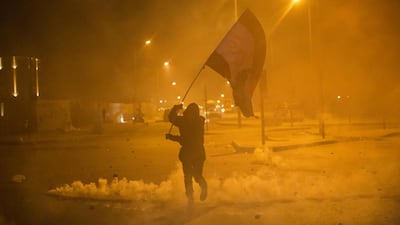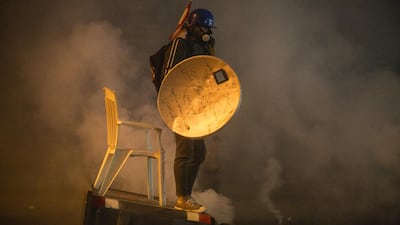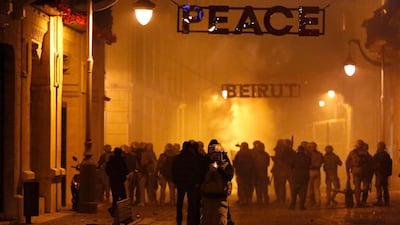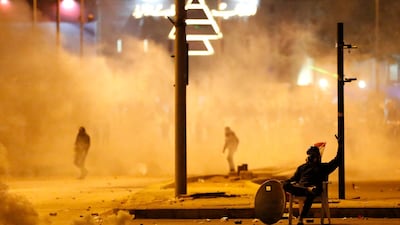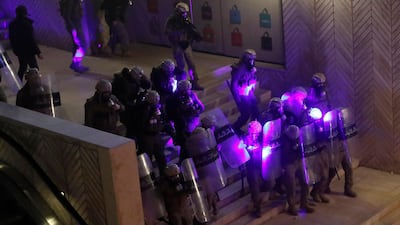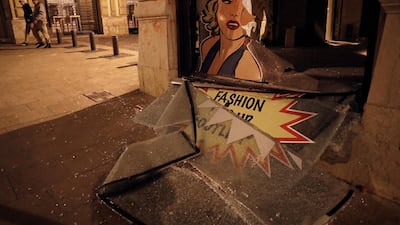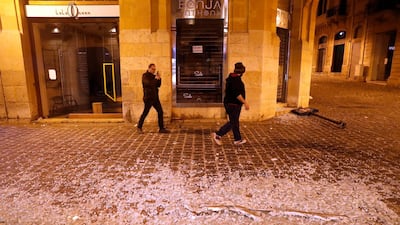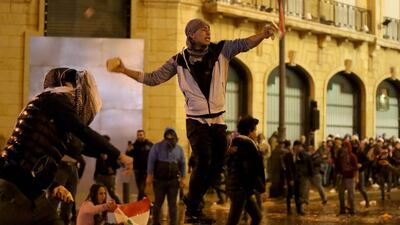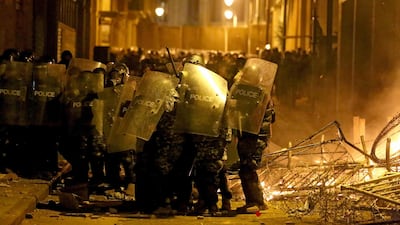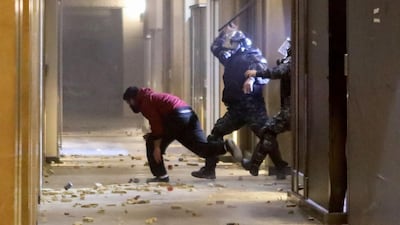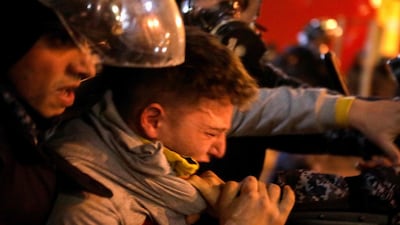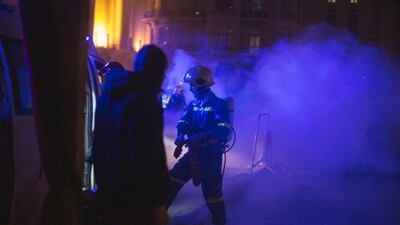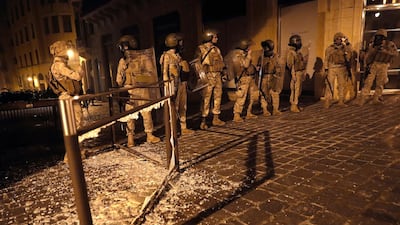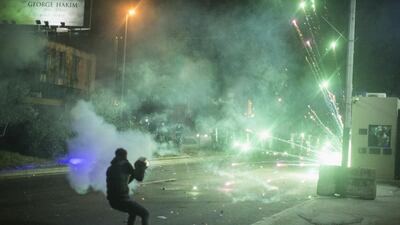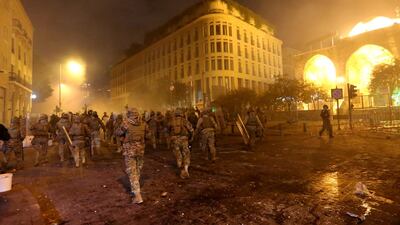Police again used tear gas and water cannon to disperse protesters as thousands of Lebanese converged on the Grand Serail to mark 100 days since the start of nation-wide anti-government protests that toppled Saad Hariri’s government.
Many have vowed to keep the movement going after a cabinet of little-known faces was brought in last week.
What started peacefully in the day with marches through central Beirut descended into chaos as darkness fell.
As protesters gathered in Riad El Solh outside the prime minister’s residence at the Grand Serail, people began to pull at the barbed wire and the fencing that blocked the street until police fired sound bombs and water cannon.
Shortly after, police fired tear gas over barricades, passed the front rows of protesters and into the thick of the protests, sending people scattering back down the road towards Martyrs' Square. Protesters threw debris back at police, some using slingshots to fire rocks.
"Rioting and attacks against Internal Security Forces have begun, we therefore ask peaceful protesters to leave Riad al-Solh area for their safety," the ISF said on Twitter.
Activists said they had wanted the night to be peaceful in order to reinvigorate the movement that in recent weeks has been clashing with security forces on a near-nightly basis. The result has been far fewer families and older people, a large contingent in the early days, joining the protesters.
Earlier in the day, as they chanted “revolution”, hundreds of people walked from the upmarket neighbourhood of Ashrafieh towards Parliament, where they met groups of protesters marching from other parts of the city mid-afternoon. They said that they to maintain pressure on the new government, which they reject.
“After almost 100 days, the ruling class still chose a government that doesn’t represent us or our demands,” said Hani Katerji, a 25-year-old management consultant.
“They think that people do not understand what is happening behind the scenes, but we all understand that this is a government based on the same political class just with different puppets.”
Over a month after he was appointed on December 19, Prime Minister Hassan Diab formed a government last Tuesday that will be tasked with urgently addressing the country’s worsening economic crisis.
Protesters say that the country’s problems have been caused by the corruption of their political class, which has ruled the country since the end of the civil war in 1990.
Despite promising to form an “independent” government, Mr Diab appointed ministers who are, in their most part, affiliated with political parties.
Protesters in Ashrafieh were warmly welcomed by locals who watched the crowd from their balconies, waved Lebanese flags and cheering demonstrators on as those on the streets called up for people to join them.
Overwhelmed with tears, one older lady came to embrace two female protesters. She told one of them that she wished she could join them but had to look after her bed-ridden mother.
“The first day after 100 [days], our revolution is a freedom revolution,” chanted the crowd.
The Lebanese chose to celebrate the milestone on Saturday despite the anniversary falling on Friday so that more people could attend during the weekend.
“We won’t keep our voices low anymore, all the Parliament on my shoe,” they continued, using a Lebanese expression for contempt.
“Their strong point is that people elected them, but the elections were corrupt,” said Perla Joe, an active protester, through her megaphone.
Protesters want early elections, but politicians argue that they were democratically elected in the first nationwide poll in nine years in mid-2018.
Mr Diab has proposed discussions on a new electoral law to replace one passed ahead of the 2018 vote that resulted from years of consultations and was intended to be fit for several elections.
A few hours later, the group from Ashrafieh converged with marches from other areas of the capital outside the Association of Banks in the city centre. Anger against banks, which have imposed strict cash withdrawal limits due to a liquidity shortage since November, is increasing in Lebanon.
“One, two, three, give me back my money,” chanted the crowd, which was cheerful despite an ominous start to the weekend.
On Friday, local media reported that men with sticks attacked a group of people marching towards a government building in a southern suburb of Beirut.
The area is known to be affiliated to Amal, a Shiite majority party closely allied to Hezbollah. Both parties have been hostile to protests. Two suspects were arrested on the orders of the new Interior Minister, Mohammad Fahmi.
By late Friday evening, a symbol of the protests – a clenched fist – was burnt down just hours after being set up in the city of Nabatieh, another Amal stronghold area in the south of the country.
Demonstrators have often been attacked by men chanting pro-Amal and pro-Hezbollah slogans, but attacks had lessened as the anti-government movement lost steam in early January.
However, it picked up again just days before the new government was announced.
Violence also spiked between protesters and riot police, which has stepped up its use of rubber bullets, maiming several people.
Protesters say they expected this.
“I don’t think the revolution can be peaceful. You cannot blame people who are starving and sick of this government,” said Mr Katerji. “It’s really bad that we are being treated this way. But it’s a sacrifice for our country.”






















